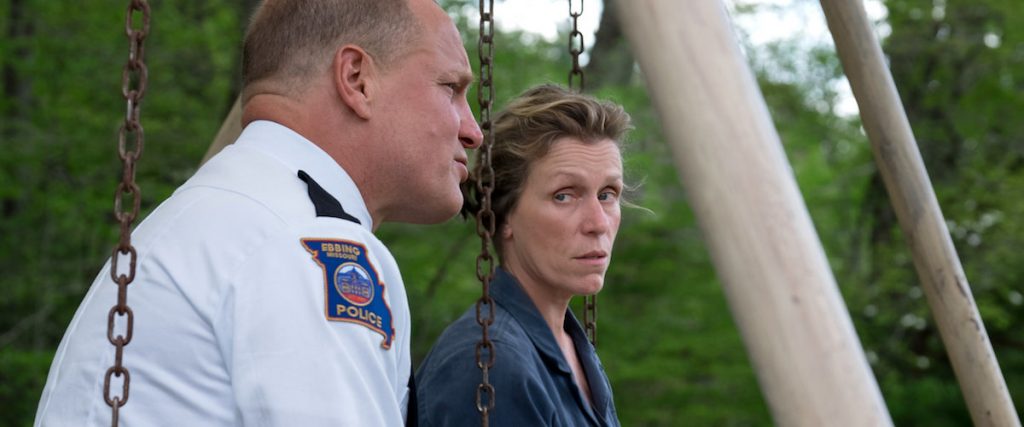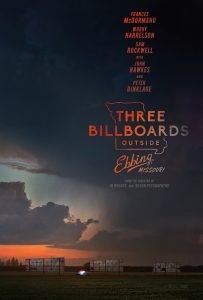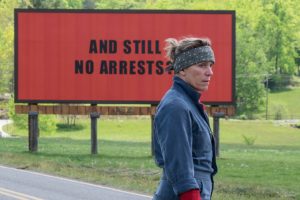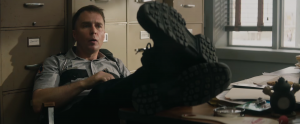Written and Directed by Martin McDonagh | 115 min | Crave Plus
It’ll be a surprise to no one that Irish/Brit filmmaker McDonagh, of In Bruges and Seven Psychopaths fame (not to be confused with his brother, John Michael, who gave us Calvary and War On Everyone) got his start in theatre. Three Billboards Outside Ebbing Missouri has the rhythms of a play, a foul-mouthed, wordy, frequently hilarious piece of stagecraft, a pitch-black comedy set in the ugliest corner of the South about the potency of both anger and forgiveness.
Mildred (Frances McDormand) grieves the rape and murder of her daughter, whose body was burned and left by the side of the road. It’s been seven months and the local police chief, Willoughby (Woody Harrelson), and his dunderheaded, openly racist deputy, Dixon (Sam Rockwell), haven’t done nearly enough to catch the killer, in her opinion. She says as much on signs 50 feet high, taking out ads on billboards at the edge of town.
Mildred’s son (Lucas Hedges) isn’t happy about this attention-getting move, and neither is her abusive ex-husband (John Hawkes), who left Mildred for a 19-year-old. Naturally, Willoughby isn’t crazy about it either. His case has gone cold, and he’s also dealing with a serious health problem.
I’m reluctant to give out too many more plot or character details, as the surprises and reversals bring a lot of the story’s pleasure. There’s a potency here in the (frequently salty) language—the picture challenges us to judge the characters for their words, while withholding key motivational details until deeper into the story. This is a dangerous tightrope to walk given the sexism and racism rife in small-town Missouri—it’s easy to see the redneck scumbags as villainous, as something other than human. McDonagh uses Mildred as his sharpest, funniest instrument, verbally disemboweling a priest when she’s not kicking teenagers in the crotch. At the same time, she’s the one carrying the pain at the heart of this thing, making a few bad choices along the way. It’s McDormand at her very best.
That’s not to say the film doesn’t stumble a little. The score is too syrupy and conventional by half, and Willoughby’s home life, with two kids and wife Anne (Abbie Cornish weirdly choosing her full Aussie accent), a little undercooked. A big decision he makes about halfway in feels a little arbitrary, maybe because we haven’t had the chance to know him well enough yet. But other supporting cast make a meal of their brief appearances, including Hawkes and Hedges, Peter Dinklage, Caleb Landry Jones, and Clarke Peters.
Rockwell gets the toughest role as Dixon, a character as loathsome as they come—an alcoholic cop aware enough of changes to cultural norms to comment on them, but too afraid to actually do anything about his own bigotry until it’s practically too late.
McDonagh refuses to let any of his Missourians be straightforward. Hollywood is so prone to offering easy moral choices and character identifications when we’re presented with something just a little more complex, like a corrigible racist, it forces us to hold two opposing thoughts in our mind at the same time. This picture serves up a strong and unsettling brew of this kind of thing, but one very much worth sipping.










